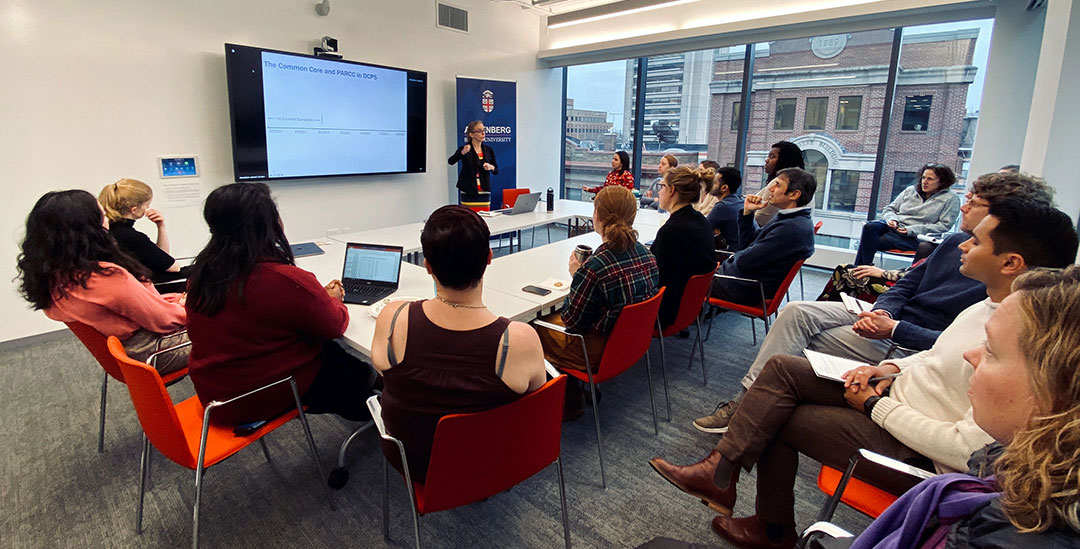Jessalynn James, Postdoctoral Research Associate at Annenberg Institute, presenting her work at the Half Baked Research Seminar
Why did you become interested in education policy?
I initially wanted to become a teacher, and when I was in college I enrolled in an educator prep program.
But from the second I entered a real classroom as part of my training, I began to see the ways in which the systems that are meant to teach and care for our children can fall apart. This ranged from the actual infrastructure of the school building, with heaters that only occasionally worked (and children having to wear winter coats throughout the school day), to the lack of training and support received by teachers. I watched my mentor teacher utterly burn out over the course of one semester.
This experience caused me to question my likely efficacy as an educator, both because of the structural inequalities that inhibit opportunity for so many children, but also because of what I felt to be grossly inadequate training both on the preparation and in-service side of teaching. I realized that there were broader dimensions on which I might be able to make a difference than as an educator in the classroom. I wanted to understand the ways in which we might be able to improve children’s access to a safe, high-quality educational experience, and in particular the ways in which we might be able to develop, recruit and retain good teachers for all students.
What has the postdoc experience at Annenberg been like for you?
I am fortunate to be working closely with two researchers—John Papay and Matt Kraft—whose scholarship has in no small part inspired my career. They are both thoughtful and impressive scholars who have helped me improve and extend my research in a way that I think would have been much more difficult to achieve had I ended up somewhere else.
Being at Annenberg at large has also been exciting over the past two years, as the Institute has grown and evolved. It’s wonderful to be a part of this rich community of people who are so passionate about education policy and trying to make things better, and I have found that in a time when the pandemic has separated many of us from our social and professional networks, Annenberg has remained a warm and connected community.
In 2021, what is the most pressing issue in education policy?
This is probably the answer that most people would give at this point, but I am very concerned about the effects of the pandemic on students everywhere.
There is of course the issue of lost learning time, but also the loss of vital social and emotional connections, the trauma of the virus and its health and economic effects on many families, and potential impacts on the teacher labor market. I realize that this is more than one issue, but they are deeply interconnected, are exacerbated by the same root cause, and may be mutually perpetuating if not sufficiently addressed. Of course, we had many of these issues—namely a deep and persistent achievement gap—long before the pandemic, but the past year has only made these inequities more severe.
Is there a low-cost policy solution to help students learn more effectively and/or better support teachers in the classroom?
Probably most of the solutions that will really make a difference will not be low cost. I prefer to think of it instead as a question of the most cost-effective solution. There are lots of ways that districts might intervene to improve their students’ learning, but I think that one of the approaches that Annenberg is betting on—high-impact tutoring—is promising. For example, it is easily tailorable to local contexts and needs, there is good evidence in support of tutoring’s effectiveness, and I can imagine that (if done well) it could also improve other intermediate outcomes that we care about, like expanding the pipeline into teaching and easing existing teachers’ workloads to an extent that might improve teacher retention.
